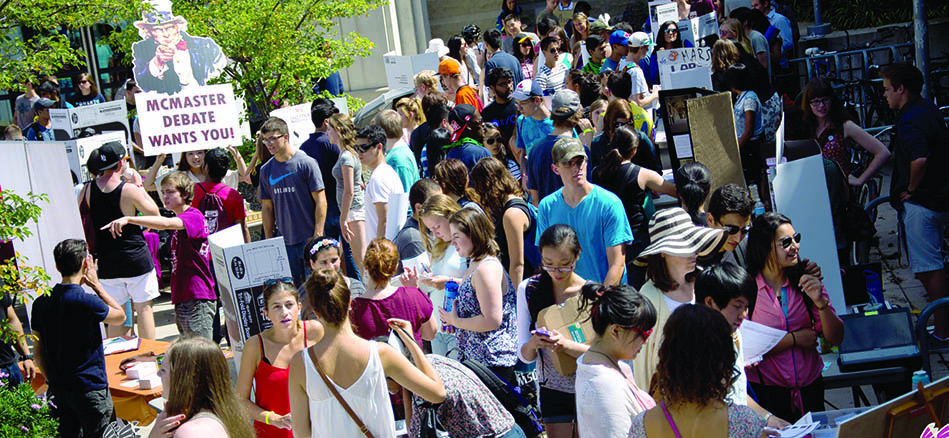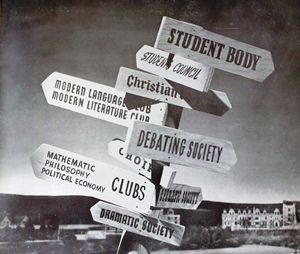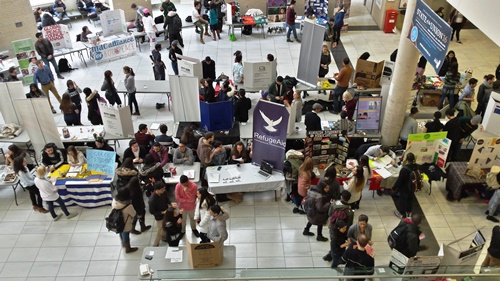A club for all reasons

This story originally appeared in the Spring 2016 issue of the Times alumni magazine.
It’s the start of a new winter term and the atrium of the McMaster University Student Centre is buzzing with life. Student clubs are out in full force at “ClubsFest” – held every September and January – to promote their causes and sign up new members.
There are clubs for singing, pre-law, tutoring, TEDx, and global peace. There’s a new club, Building Our Safe Schools or B.O.S.S., which aims to combat bullying. The Mac Alliance for Body Peace fights eating disorders. Want to play video games while raising money for the McMaster Children’s Hospital? There’s a club for that.
Find a list of McMaster Students Union clubs here
There are political clubs, clubs that help refugees, clubs for students from Afghanistan to Greece to Sri Lanka to Vietnam, and clubs that raise money to combat diseases such as lupus and Parkinson’s. Clearly, there’s a lot of passion in the room – and there are a lot of clubs at McMaster. With 50 new ones ratified this January, there are now 321 clubs, which makes Mac’s student club system one of the largest in the country, says administrator Joshua Patel ’15. And that’s compared to other universities with much greater student populations, he points out.
 “Students at Mac are definitely very pro-active,” he says. “If students want to voice their opinions, they’ll find a way to do it. And one way to do it is by starting a club.”
“Students at Mac are definitely very pro-active,” he says. “If students want to voice their opinions, they’ll find a way to do it. And one way to do it is by starting a club.”
To begin with, you need at least 10 signatures. Then, a budget and a plan of action. You must show that your idea is unique and can maintain significant student interest. Most importantly, your club must have a positive impact on the McMaster community.
“Students are responding to current world issues and starting clubs to take action or raise money for a cause,” says Patel, who points out that every club must re-apply every year.
Toronto the Good
McMaster students have been getting together to form clubs since the University’s establishment in 1887. Although there were less than 200 students on campus, the first decade saw the founding of clubs for checkers, chess, choral and orchestral music, classics, mathematics, philosophy, and science. Also found on campus was a Demosthenian Oratorical Society and a Literary Society, whose first debate on record was “that the Sunday laws are too stringent and should be modified.” This was Toronto the Good, after all.
By 1910, students had invited Sir Wilfrid Laurier and Henri Bourassa to speak. In 1911, the topic of debate was whether “free trade between Canada and the United States would be detrimental to the best interests of the Dominion.”
It wasn’t all sober second thought. In 1919, the Society of Whouphanpouphers was created for “the promotion of noise and hilarity” – no doubt, a much-needed release after the horrors of the First World War.
The Westdale campus
 Over the decades, McMaster students remained actively involved with the world around them, and all the more so when the University moved in 1930 to a much more spacious campus in Hamilton.
Over the decades, McMaster students remained actively involved with the world around them, and all the more so when the University moved in 1930 to a much more spacious campus in Hamilton.
In 1932, students co-hosted the British Debating Team in the Assembly Hall to match wits on the subject of “Resolved that man exists in prosperity but lives in adversity.” Admission was 25 cents and ladies were “cordially invited.” After the Second World War, topics for debates included “the need for world government” and “the role of atomic power in peacetime.” In 1956, the International Relations Club arranged a panel discussion on the Suez crisis.
Undergraduates also raised $1,700 for Hungarian refugees – not bad for a student body of 1,000. There were now at least 50 student organizations, much to the alarm of the Faculty Association, which singled out the Operatic Society as the greatest time-consumer.
Notably, all clubs were now co-ed. By the 1970s, student organizations were indelibly intertwined with the social, political and cultural ferment of the time. The year 1975 alone saw visits from Ralph Nader, Leonard Cohen, Steppenwolf, David Suzuki, Buckminster Fuller, Germaine Greer, and George Carlin.
Life in the 21st century
Clubs continued to grow steadily in number and scope, but it was at the turn of the 21st century that things really took off.
In 2000, there were 120 clubs, administered with an annual budget of $35,000. Ten years later, the budget had almost quadrupled to $134,000 with 250 clubs, reflecting the burgeoning student population.
Today, McMaster enrolls more than 22,000 full-time undergraduates, and Josh Patel oversees a budget of $160,000. This provides a stipend of between $250 and $300 per club, and it also pays for his salary and those of two part-time assistants. Patel, who graduated in 2015 with a BScH in environmental science, is on the go all day long, juggling multiple priorities.
“We’re here to empower students to run with their ideas,” he says. Not too surprisingly, a lot of his time is spent on mediation and negotiation. “But things always work out.”



